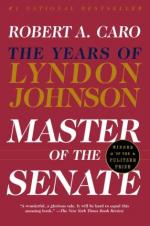|
This section contains 966 words (approx. 3 pages at 400 words per page) |

|
Part 4 Chapter 26 Summary
LBJ's exercise of power made the Senate work. Bills emerged from committees more swiftly and, with all points of contention already ironed out, they passed quickly. The annual reciprocal trade bill provides an example. It normally tied the Senate up for weeks, but in 1955, LBJ moved all the dickering into the Finance Committee, where, out of the public view, senators had no reason to posture. There LBJ could obtain compromises, secure a unanimous consent agreement to limit debate and rally enough support to invoke Article I, Section 5 of the Constitution, allowing the customary voice vote to be dispensed with. The act passed in three days.
The Upper Colorado River Reclamation Bill, hotly debated in session after session but never passed, also breezed through LBJ's system in three days. The Paris Accords, expected to cause a row, passed after two hours of...
(read more from the Part 4 Chapter 26 Summary)
|
This section contains 966 words (approx. 3 pages at 400 words per page) |

|




